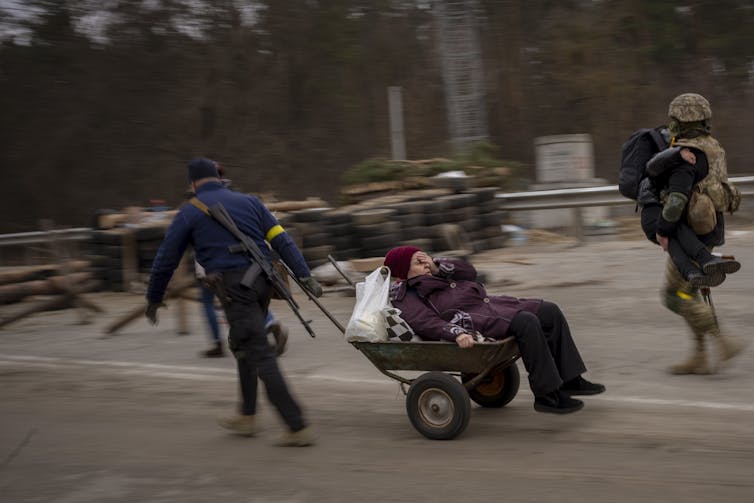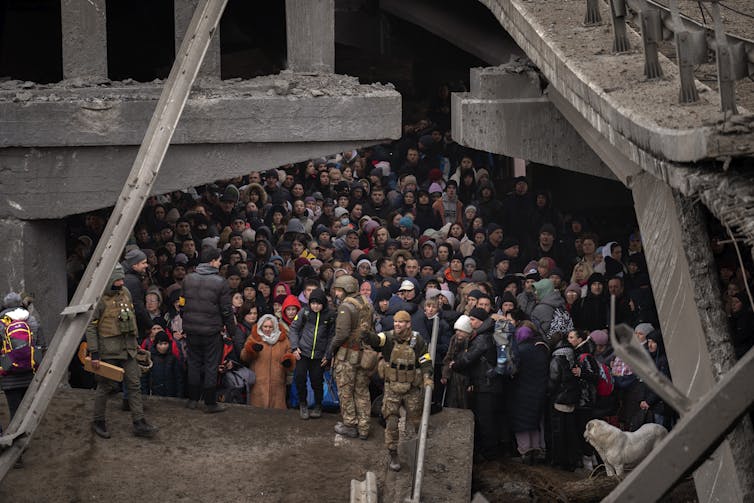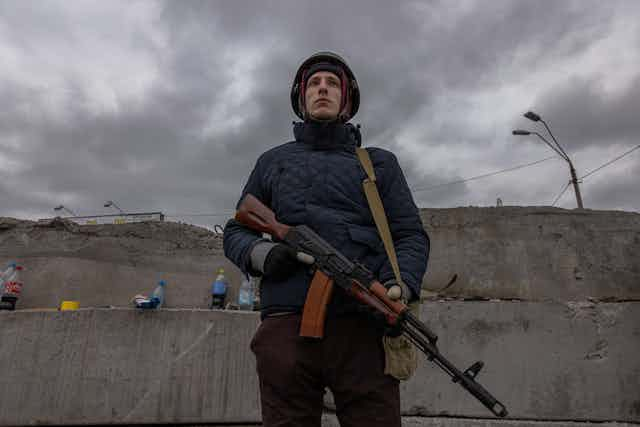As Ukraine scrambles to defend itself from Russia’s illegal invasion, men aged 18 to 60 have been banned from leaving the country.
The declaration of martial law in Ukraine gives the government power to enact this ban, but it is not in keeping with human rights or humanitarian norms.
So, what is actually happening in Ukraine and what does the law say?
What the Ukrainian government says
When Russia invaded last month, Ukrainian President Volodymyr Zelensky called on Ukrainian civilians to defend their country.
As the Ukrainian interior ministry also posted on Telegram:
Today is the moment when every Ukrainian who can protect his home must take up arms. Not just to help our soldiers, but to cleanse Ukraine of the enemy once and for all.
But if you are a man between 18 and 60, this call to arms may seem more like a compulsory requirement. As Ukraine’s border guard service explains, the ban on adult men leaving is aimed at guaranteeing “Ukraine’s defence and the organisation of timely mobilisation’”.
What does self-defence look like?
Given the illegality of Russia’s invasion, Ukraine is entitled to defend itself under the United Nations Charter. Of course, a country will rely on all available military resources to exercise this right of self-defence.
Ukraine already has a sizeable army, with 200,000 active personnel and 300,000 reservists, as well as paramilitary forces who are now being mobilised under the general mobilisation decree.

But Ukraine’s military resources pale in comparison to Russia’s modern, professional army built up through massive investment over the past decade. It has about 900,000 active personnel and about two million reservists.
Given the obvious imbalance, it is not surprising Ukraine is now desperate to mobilise every eligible individual. But there is an important distinction between people who are conscripted into military service and people who are banned from leaving, but not then formally mobilised or equipped to fight.
Conscientious objection
With their country facing armed attack by a major military power with the aim of overthrowing their government, some Ukrainians have felt compelled to stay and potentially fight.
Read more: How the Russian military remade itself into a modern, efficient and deadly fighting machine
Some have enlisted in the wake of Russia’s invasion. These brand new soldiers have been called both conscripts and volunteers.
Others have felt compelled to leave. The very nature of the conflict puts civilians at risk - it is playing out in densely populated cities, through shelling and aerial bombardment. Already more than one million people have fled.
However, for men aged 18 to 60, the ban on leaving Ukraine means they have no choice to flee the attack and the risks they face as civilians in the theatre of war.
A New York Times podcast tells the story of an animator named Tyhran, who unsuccessfully tried to cross the border into Poland.
I can’t imagine myself doing military stuff […] I have no experience in it. I’m afraid of holding a gun […] I cannot imagine myself holding a gun.
Tyhran says he was shamed at the border by guards and others seeking to cross, but may try again to cross illegally.
They are bombing and people are dying. Everyone is running […] They are not going to stop. They just want to destroy.
Meanwhile, there are reports LGBTQI+ Ukrainians are terrified of being targeted, given Russia’s program of discrimination against gay and transgender people in Russia.
What international law says
The International Covenant on Civil and Political Rights guarantees freedom of thought, conscience and religion or belief. Although it does not specifically guarantee a right to conscientious objection to military service, the UN Human Rights Committee has confirmed this right derives from the protection under the convention.

This means that if a person’s conscience, religion or beliefs conflict with an obligation to use lethal force against other people, their right to conscientious objection to military service must be protected.
Some human rights can be suspended or limited during a public emergency. But the right to freedom of conscience is specifically excluded from this category.
What should Ukraine do?
The government of Ukraine should cancel its ban on men leaving the country. To maintain it will violate the freedom of conscience of any man who wishes to flee due to a conscientious objection to killing others.
In relation to LGBTQI+ people, the ban could also be regarded as preventing people with a well founded fear of persecution from fleeing to seek refuge outside Ukraine.
Read more: Civilians are being killed in Ukraine. So, why is investigating war crimes so difficult?
More broadly, repealing the departure ban would protect Ukraine from allegations it is failing to protect civilians, as required by international humanitarian law. It is one thing to conscript men into military service, providing training and appropriate equipment (although, even in that case, a right to conscientious objection must be respected).
It is another thing entirely to prevent civilians from escaping a war zone.
The international context
Ukraine must also consider how its actions reflect on parallel efforts to hold Russia accountable for its illegal aggression and potential violations of human rights.
For example, Ukraine has requested the International Court of Justice to intervene with the international law equivalent of an injunction against Russia. Ukraine alleges Russia is using false accusations of genocide to justify an illegal invasion that is, in turn, inflicting human rights violations on the people of Ukraine.
Meanwhile, the International Criminal Court’s prosecutor has initiated an investigation of Russia’s actions in Ukraine. The prosecutor has identified a reasonable basis to believe that alleged war crimes and crimes against humanity are underway in Ukraine.
In this context, Ukraine must remain mindful of the legality of its own practice. The ban on men leaving Ukraine ought to be lifted, because it is legally and ethically wrong to force civilians to stay in harm’s way when they have the opportunity and desire to escape.

